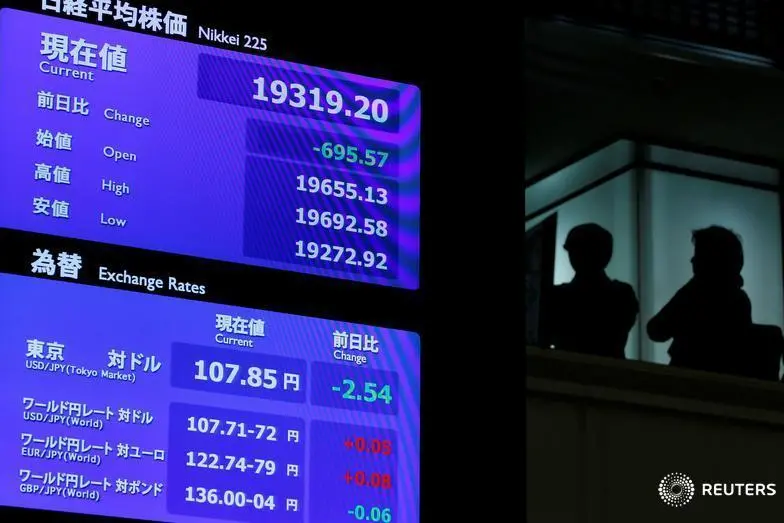PHOTO
- Asian shares drop early on Monday on weak Chinese trade data
- Middle East markets mostly added gains on Sunday
- Oil prices fell on weak Chinese trade data on Monday
- Dollar steadies, gold prices strengthen
Asian shares
China’s December exports fell by 4.4 percent from a year earlier, the biggest monthly drop in two years, official data showed on Monday. Imports also dropped, falling 7.6 percent, the biggest decline since July 2016. Investors focused on the data from Asia’s largest economy for market direction.
Asian shares dropped in early trading on Monday, following the news on Chinese trade data.
MSCI’s broadest index of Asia-Pacific shares outside Japan stumbled 0.7 percent after climbing to the highest since early December on Friday, with Chinese and Hong Kong shares the biggest losers.
Investors expect volatility to rise this week, “as some key issues that have been affecting market sentiment approach decision points,” Nick Twidale, analyst at Rakuten Securities, told Reuters.
“Expect sentiment to continue to dominate market direction with trades focusing closely on the news channels for the next twist in the various issues that are influencing the market.”
Middle East markets
Most markets in the region added gains on Sunday, with the Egyptian and Saudi market leading gains.
Egypt’s blue-chip index EGX30 added 1.2 percent on Sunday, boosted by a 2.6 percent jump in the shares of Commercial International Bank and 4.9 percent rise in the shares of Sixth of October Development and Investment Company.
Saudi Arabia’s index gained 1 percent, as Al Tayyar Travel Group Holding Company rose 5.5 percent and Al Rajhi Banking & Investment Corp gained 2 percent.
Dubai’s index edged 0.3 percent lower. Union Properties lost 1.9 percent, weighing on the index as it was the stock registering the highest trading volume. Neighbouring Abu Dhabi’s index edged 0.1 percent higher.
Boursa Kuwait, upgraded Qurain Petrochemical and Human Soft Holding Co to the premier market, and the index closed 0.4 percent higher.
Qatar’s index was mainly unchanged while Oman’s index edged 0.2 percent lower and Bahrain’s index gained 0.2 percent.
Oil prices
Oil prices followed global markets lower early on Monday, as Chinese data weighed on sentiment.
International Brent crude oil futures were at $59.78 per barrel at 0312 GMT, down 70 cents, or 1.2 percent from their last close.
U.S. West Texas Intermediate (WTI) crude futures were down 63 cents, or 1.2 percent, $50.96 a barrel.
Ole Hansen, head of commodity strategy at Denmark’s Saxo Bank, told Reuters “the deterioration seen recently in forward-looking economic data from the U.S. to Europe and China” meant that the upside for crude oil futures was likely limited to $64 per barrel for Brent and for $55 for WTI.
Currencies
The dollar steadied on Monday following gains in the previous session.
The dollar’s index, which measures the greenback against a basket of major currencies, was marginally higher in early Asian trade.
Precious metals
Gold prices edged higher on Monday supported by expectations that the U.S. Federal Reserve will not raise rates this year.
Spot gold was up 0.2 percent at $1,289.50 per ounce, as of 0040 GMT.
U.S. gold futures were steady at $1,289.90 per ounce.
(Reporting by Gerard Aoun; Editing by Mily Chakrabarty)
(gerard.aoun@refinitiv.com)
Our Standards: The Thomson Reuters Trust Principles
Disclaimer: This article is provided for informational purposes only. The content does not provide tax, legal or investment advice or opinion regarding the suitability, value or profitability of any particular security, portfolio or investment strategy. Read our full disclaimer policy here.
© ZAWYA 2019




















